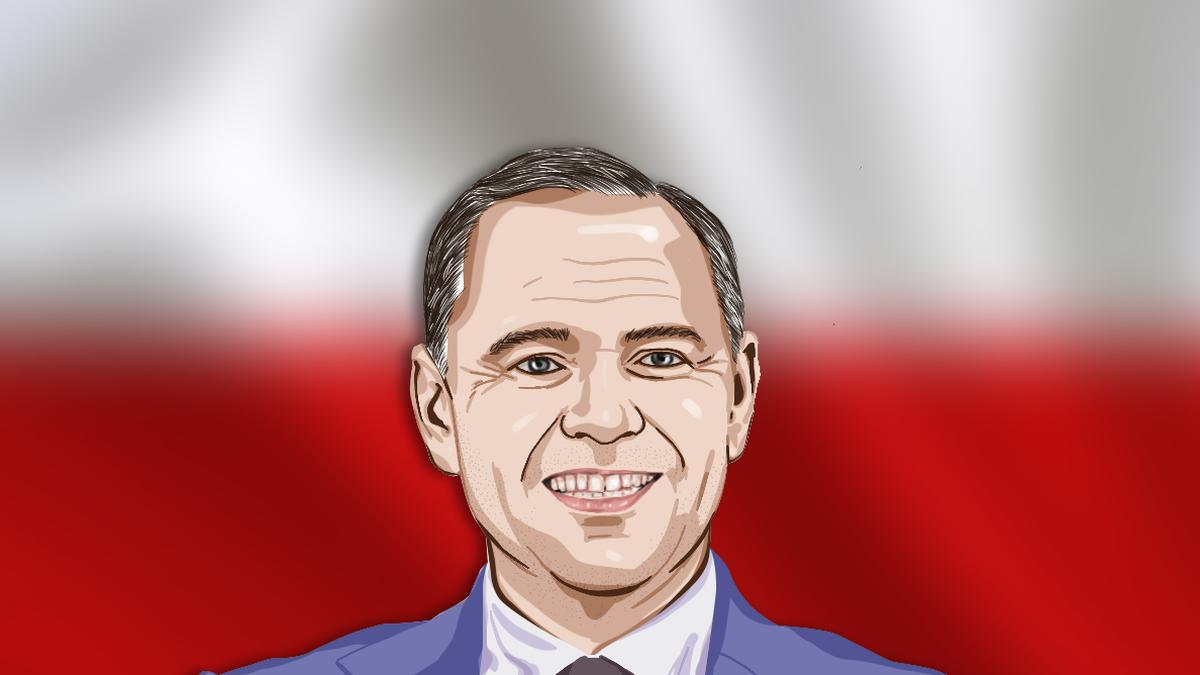Karol Nawrocki
| Photo Credit: Illustration: Sreejith R. Kumar
Karol Nawrocki, a 42-year-old conservative historian, won the run-off of the Polish presidential election on June 1, securing 50.89% of the vote against the liberal Warsaw Mayor Rafal Trzaskowski. This victory, one of the tightest in Poland’s post-communist history, was achieved after Mr. Nawrocki finished second in the first round of voting on May 18, with 29.54% against Mr. Trzaskowski’s 31.36%.
Mr. Nawrocki’s victory came as a surprise to many observers, as initial exit polls on election night showed Mr. Trzaskowski with a narrow lead. His path to victory was built on successfully mobilising voters who in the first round had supported far-right candidates, overcoming Mr. Trzaskowski’s first-place finish in the initial ballot.
Throughout his campaign, Mr. Nawrocki ran as an independent candidate but was heavily backed by the nationalist-conservative Law and Justice (PiS) party, the political home of the outgoing president, Andrzej Duda. His victory was also welcomed by the U.S. administration of President Donald Trump, who had hosted Mr. Nawrocki a month prior to the election, with Homeland Security Secretary Kristi Noem publicly endorsing him during a Conservative Political Action Conference (CPAC) in Warsaw.
Before his presidential run, Mr. Nawrocki served as the president of the National Institute of Remembrance (IPN) — a powerful state institution responsible for prosecuting Nazi and Communist-era crimes and shaping Poland’s historical narrative. His leadership at the IPN, and his prior role as director of the Gdansk World War II Museum, were marked by an emphasis on Polish heroism, victimhood, and the decommunisation of public spaces, aligning with the historical policies of the PiS government.
Mr. Nawrocki’s public career is built upon his academic work as a historian with a doctorate focusing on Poland’s anti-communist resistance, a theme that consistently informed his institutional policies. This focus on narratives of national struggle against foreign domination resonated with the electorate, delivering him a sweeping 64.2% of the vote in rural villages, even as Mr. Trzaskowski dominated large cities with over 66% of the vote. Prior to the presidential campaign, Mr. Nawrocki was a figure largely unknown to the broader Polish public, having never held elected office. Throughout the campaign, he cultivated a strongman image, frequently posting videos from boxing rings and shooting ranges, which contrasted with the more polished, multilingual image of his rival, Mr. Trzaskowski.

Right-wing support
The election saw Mr. Nawrocki successfully consolidate the right-wing vote in the second round, reportedly attracting 87% of the supporters of the third-place finisher, far-right leader Slawomir Mentzen. This coalition of voters backed his platform opposing the EU’s federalist tendencies and climate policies, and vowing to block Ukraine’s bid to join NATO.
During his rise in public life, Mr. Nawrocki has faced serious personal allegations, including claims of past involvement in organised football hooliganism, which he has publicly admitted. More severe accusations, which he has vehemently denied, concern the acquisition of an apartment from an elderly person under allegedly questionable circumstances.
With his inauguration set for August 6, Mr. Nawrocki’s victory sets the stage for a period of political tension with the centrist government led by Prime Minister Donald Tusk. Polish presidential power to veto legislation, combined with the Tusk government’s lack of a parliamentary supermajority to override such a veto, creates a high potential for political gridlock over key reforms concerning the judiciary, abortion law, and civil unions.
While Mr. Nawrocki has voiced support for Ukraine’s defence against Russia, he has expressed scepticism about its potential NATO membership and has questioned the long-term costs of aid to refugees, a rhetorical shift from the previous government’s posture. This stance was noted by international observers, with Ukrainian President Volodymyr Zelenskyy offering congratulations, while Hungary’s Prime Minister Viktor Orbán — a critic of EU policy — hailed Mr. Nawrocki’s “fantastic victory”.
Published – June 08, 2025 01:24 am IST

